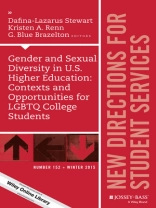Since 2005, research on identity development, campus climate and policies, transgender issues, and institutional features such as type, leadership, and campus resources has broadened to encompass LGBTQ student engagement and success. This volume includes this enlarged body of research on LGBTQ students, taken in the context of widespread changes in public attitudes and public policies related to LGBTQ people, integrating scholarship and student affairs practice.
Specific foci include:
* transgender identity development,
* understanding intersections of sexual orientation and gender identity with other salient identities such as faith/religion/spirituality, race, social class, and ability, and
* studies about LGBTQ students in special-mission institutions (for example, Historically Black Colleges and Universities, religiously affiliated institutions, or women’s colleges).
This is the 152nd volume of this Jossey-Bass higher education quarterly series. An indispensable resource for vice presidents of student affairs, deans of students, student counselors, and other student services professionals, New Directions for Student Services offers guidelines and programs for aiding students in their total development: emotional, social, physical, and intellectual.
Spis treści
EDITORS’ NOTES 1
Dafina-Lazarus Stewart, Kristen A. Renn, G. Blue Brazelton
1. Evolving Nature of Sexual Orientation and Gender Identity 11
T.J. Jourian
This chapter presents the continuing evolution of terminology, constructs, and ideologies that inform the language used by and about those who have minoritized identities of sexuality and gender.
2. Students with Minoritized Identities of Sexuality and Gender in Campus Contexts: An Emergent Model 25
Annemarie Vaccaro, E. I. Annie Russell, Robert M. Koob
The authors of this chapter synthesize the limited empirical evidence about demographics and experiences of college students with minoritized identities of sexuality and gender (MIo SG) in the United States across institutional types and present the MIo SG Students in Context Model.
3. LGBTQ Experiences in Curricular Contexts 41
Jodi L. Linley, David J. Nguyen
In this chapter, the impact of climate on people, including how they show up and display identities in classroom contexts, is discussed through an examination of the representation and visibility of LGBTQ faculty and staff and topics related to LGBTQ lives.
4. Cocurricular and Campus Contexts 55
Debra Bazarsky, Leslie K. Morrow, Gabriel C. Javier
The representation and visibility of models and mentors with MIo SG across student affairs and auxiliary services are explored in this chapter, as well as the opportunities and challenges for campus climates inclusive of sexual and gender diversity across different campus areas (for example, residence halls, off-campus residences, neighborhood engagement, health and wellness centers, recreation and athletics, career services).
5. Identifying, Quantifying, and Operationalizing Queer-Spectrum and Trans-Spectrum Students: Assessment and Research in Student Affairs
73
Susan (Sue) Rankin, Jason C. Garvey
The authors discuss various aspects related to assessment and research with queer-spectrum and trans-spectrum campus communities, connections to student success research, and the role of institutional research units.
6. Recommendations 85
G. Blue Brazelton, Kristen A. Renn, Dafina-Lazarus Stewart
In this final chapter, the editors revisit the key ideas and points raised in the preceding chapters and outline recommendations for research, policy, and practice to effect transformative change in higher education for LGBTQ students.
INDEX 9
O autorze
Volume Editors:
Dafina-Lazarus Stewart is associate professor of higher education and student affairs at Bowling Green State University.
Kristen A. Renn is professor of higher, adult, and lifelong education at Michigan State University.
G. Blue Brazelton is assistant professor of higher education and student affairs at Northern Michigan University.
Series Editor-in-Chief:
Elizabeth J. Whitt is vice provost and dean for undergraduate education at University of California, Merced.












